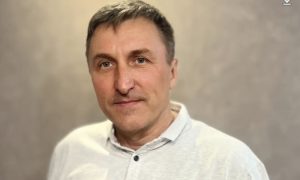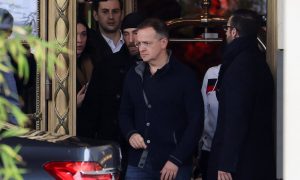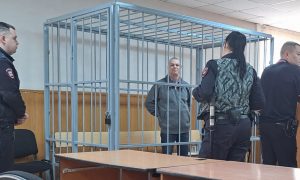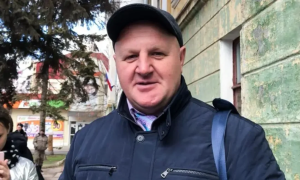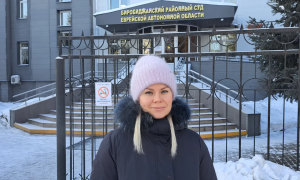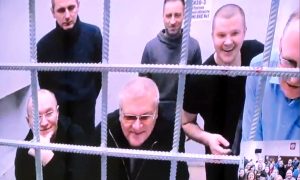The Moscow Patriarch distances itself from the government policy but at the same time terms it  “a positive gesture”. The ban also concerns Catholics, who fear “new forms of discrimination”. The Russian “symphony” between the throne and the altar reproduces patterns of Soviet times. The visit of the remains of St. Nicholas in Russia as a wish of unity in the faith of the undivided Church.
Moscow (AsiaNews) – The Russian Federation’s Supreme Court’s decision to ban the activity of Jehovah’s Witnesses on April 20, is stirring up reactions and comments in Russia and the world, raising the issue of religious freedom again in the country which has passed from “Soviet militant atheism” to Putin’s “religious rebirth”.
Ilarion’s statements
In particular, in the last few days, the patriarchal “Secretary of State” , metropolitan Ilarion of Volokolamsk, president of the Russian Foreign Affairs Council has made some statements to TASS newsagency. On 29 April he had issued a statement that the decision of the Russian Supreme Court, which defined Jehovah’s Witnesses as an “extremist association”, was taken without any consultation with the Orthodox Church. “I would like to emphasize that the Church has taken no part in this matter,” the Metropolitan said. “The Church does not appeal for heretics, members of sects or dissenters to be prosecuted. However, the decision to ban Jehovah’s Witnesses is to be considered a positive act in the fight against the spread of sectarian ideas, which have nothing in common with Christianity,” according to Ilarion. “There is no doubt that sectarians will remain and continue their activities, but at least they will stop being openly on the same floor with Christian confessions, and that is a good thing.” The Patriarchal Representative concluded that “the activity of Jehovah’s Witnesses violates the norms of the Civil Code”.
Â
 

On May 2, the metropolis intervened in a TV program “Russia 24”, further stating: “This is a totalitarian and dangerous sect. I am deeply convinced, having had more than once the opportunity to speak with members out of the sect. The members of this association are dangerous because they approach people on the street and offer their literature, presenting themselves as a Christian group. In fact, their activities are based on the manipulation of consciences. They erode the psyche of people and families. ” Moreover, according to Ilarion, “they deform Christ’s teaching and falsely interpret the Gospel. Their doctrine contains many lies: they do not believe in Jesus Christ as God and Savior, they do not recognize the doctrine of the Holy Trinity, and therefore cannot be called Christians.”
True and False Faith
In the words of the metropolitan Ilarion, echoing the thoughts of  Patriarch Kirill, the concerns of the ecclesiastical hierarchy over the “unfair competition” of Jehovah’s Witnesses are evident, according to a rigid conception of Orthodoxy, called to defend the “true faith”. He has, in fact, associated the sectarian group with “heretics” and “dissidents”, while asserting that the Church does not demand their persecution, but does demand that they not be placed  “on the same level” as true Christians.
The spirit of the 1997 Freedom of Religion, which called an abrupt halt to the spontaneous “religious rebirth” of post-communism and began the true “Orthodox rebirth” of Russia are reflected in his words. In the preamble of the law, the superiority of Orthodox faith over other “traditional religions” of the country was stated, namely Christianity (distinct from Orthodox!), Islam, Buddhism and Judaism. Since then, the restrictions on non-Orthodox confessions have steadily increased, along with the spectacular strengthening of the structures of the Patriarchate of Moscow, which by the number of churches and monasteries today has reached a diffusion in the country never experienced throughout its history. Already in the 90s, the then Metropolitan Kirill, in the role played by Ilarion today, insisted on every occasion on the need to ban the “destructive sects” and to distinguish Orthodoxy from other “heretic” Christian confessions, such as Catholicism and Protestantism, guilty of “aggressive proselytizing.” As for the “dissidents”, it is strange that Ilarion used the Soviet word inakomysljashye in his statement, the “different thinking” who in the 1970s ended up being interned in Brežnev’s psychiatric hospitals.
Church Interference
The metropolitan however reassured the “non-interference” of the Orthodox Church in Supreme Court decisions, stating that they had not even been consulted. In fact, the counselor and lawyer of the case against Jehovah’s Witnesses at the Court, Aleksandr Dvorkin, is a distinguished character of the same Orthodox Church, a professor and a specialist in the history of sects in many universities, first of all the Institute of San Tikhon, the main Patriarchate Culture Center, author of numerous publications and very close to Kirill and Ilarion.
Dvorkin is head of the Committee of Experts of the Russian Ministry of Justice for Religious Affairs, which closely resembles the notorious “Council for Religious Affairs” of Soviet times. The same Russian Justice Minister, Aleksandr Konovalov, is a student and disciple of Dvorkin. In fact, there is no need for direct intervention of ecclesiastical hierarchies when the same politicians and people who are appointed to oversee religious affairs are themselves eminent members of the Church. This is what Orthodox tradition calls the “symphony” between Church and State, when the Church proclaims the truths of faith, and the state defends them.
Persecution and rehabilitation
The most disconcerting aspect of this story is that Jehovah’s Witnesses – persecuted at the time of Stalin – had been rehabilitated and proclaimed heroes of resistance to state atheism after the end of communism. One of the first laws of the new Russia, approved on October 18, 1991, was on “Rehabilitation of the victims of political repression”, according to which those who had been sentenced in the Soviet period under art. 227 of the Criminal Code of 1960, which accused “the activity of groups of citizens who, on the pretext of performing religious functions, endanger the health of citizens by violating public order.” Almost all priests, even orthodox, were condemned with this article, and so too Jehovah’s Witnesses. The latter suffered mass deportations in the 1950s to the most remote areas of Siberia and the Far East. Many elderly, members of the sect, still enjoy special tax and civil privileges today following rehabilitation. What has changed since 1991? Many observers are posing this question. Certainly not the Jehovah’s Witnesses, whose activity is well-known throughout the world, and which is carried out according to wholly repetitive methodologies, whatever the regime under which they reside.
The opinion of Catholics
Meanwhile, the secretary-general of the Russian Catholic Bishops’ Conference, Msgr. Igor Kovalevsky, issued a statement to a Catholic magazine on May 2 that “the situation in Russia today is complex and difficult. Catholics have serious concerns about having to face, if not persecution, at least the new forms of discrimination and the limitation of our freedom to profess our faith. ” According to Kovalevsky, “the law must be applied to everyone with justice … laws can be severe, but remain inviolable. I think the government should give everyone a clear explanation of the reasons that led to the liquidation of this organization. “
The Catholic prelate concluded by stating that “Jehovah’s Witnesses have the same right to defend their dignity in the faith as all other citizens. Although the defense of human rights is not our main task, the Catholic Church supports everybody’s right to freedom of conscience. “
The blessing of St. Nicholas
Meanwhile, Russia is waiting for the remains of St. Nicholas of Bari to arrive in Moscow. They will be in Moscow from May 21 until July, when they will be exposed to the devotion of the faithful in St. Petersburg until July 28. Millions of pilgrims are waiting to visit the patron saint of Russia and this marks the first time they have been exhibited in the country since 1073, when the remains of the bishop of Mira were transported to Bari. According to the protopriest Maksim Kozlov, one of the most prominent representatives of Patriarchate of Moscow, this event indicates that “the Russian Orthodox Church and the Roman Catholic Church have finally found the right direction in their relations, Â the shared foundations of the ancient Church of the first millennium. “
It is hoped that the blessing of St. Nicholas, one of the most beloved saints around the world, will help overcome the fears of new divisions and persecutions.
http://www.asianews.it/news-en/Russian-Orthodox-against-Jehovah’s-Witnesses-40640.html
